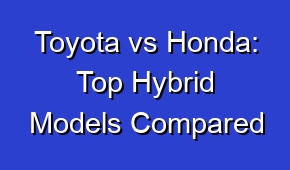Hyundai Ioniq vs. Toyota Prius: Green Giants Compared

Get ready to compare two of the top contenders in the eco-friendly car market: the Hyundai Ioniq and the Toyota Prius. Both these green giants offer impressive fuel efficiency, cutting-edge technology, and sleek designs. In this article, we’ll delve into the key features and specifications of each model, helping you make an informed decision on which one suits your needs best.
The Hyundai Ioniq and Toyota Prius are two green giants in the automotive industry, offering eco-friendly options for environmentally conscious drivers. With their advanced hybrid technology, both vehicles are designed to reduce emissions and improve fuel efficiency.
The Hyundai Ioniq stands out with its sleek design and impressive fuel economy. Equipped with a powerful electric motor and a 1.6-liter gasoline engine, it delivers a smooth and efficient driving experience. On the other hand, the Toyota Prius is known for its iconic status as one of the first mainstream hybrid cars. Its hybrid synergy drive system combines a gasoline engine with an electric motor, providing excellent fuel efficiency.
Both the Ioniq and the Prius offer a range of advanced features, including regenerative braking, which helps to recharge the battery while decelerating, and smart cruise control, which adjusts speed to maintain a safe distance from other vehicles. Additionally, both models prioritize safety with features like lane departure warning, blind spot detection, and automatic emergency braking.
In conclusion, whether you choose the Hyundai Ioniq or the Toyoa Prius, you can be confident in driving a green giant. These vehicles not only offer impressive fuel efficiency but also prioritize safety and advanced technology.
| Green giants: Hyundai Ioniq vs. Toyota Prius |
| The Hyundai Ioniq offers impressive fuel efficiency and a sleek design. |
| The Toyota Prius is known for its long-standing reputation as a reliable hybrid. |
| Both the Hyundai Ioniq and Toyota Prius are eco-friendly options for environmentally conscious drivers. |
| The Hyundai Ioniq boasts a spacious interior and advanced safety features. |
| The Toyota Prius excels in terms of hybrid technology and overall performance. |
- The Hyundai Ioniq and Toyota Prius are green vehicles with low emissions.
- The Hyundai Ioniq offers multiple powertrain options, including hybrid, plug-in hybrid, and electric.
- The Toyota Prius is known for its exceptional fuel economy and reliability.
- The Hyundai Ioniq has a competitive price point compared to the Toyota Prius.
- The Toyota Prius has a spacious cargo area, making it practical for daily use.
What are the main differences between Hyundai Ioniq and Toyota Prius?
Hyundai Ioniq and Toyota Prius are both popular choices in the green car market, but they have some key differences. One main difference is their design. The Ioniq has a sleek and modern look, while the Prius has a more distinctive and futuristic design. Another difference is their fuel efficiency. The Prius is known for its exceptional fuel economy, with higher MPG ratings compared to the Ioniq. However, the Ioniq offers a plug-in hybrid option, which allows you to drive on electric power alone for a certain distance.
| Hyundai Ioniq | Toyota Prius | Main Differences |
| Available in hybrid, plug-in hybrid, and electric versions. | Available only in hybrid version. | Hyundai Ioniq offers more options in terms of powertrain. |
| More affordable starting price. | Higher starting price. | Hyundai Ioniq is generally more budget-friendly. |
| Slightly smaller interior space. | Spacious interior. | Toyota Prius offers more room for passengers and cargo. |
Which car has better performance, Hyundai Ioniq or Toyota Prius?
When it comes to performance, both the Hyundai Ioniq and Toyota Prius are designed with fuel efficiency in mind rather than high performance. However, the Prius has a slight edge in terms of acceleration and overall power. The Ioniq, on the other hand, offers a smoother and more comfortable ride with its refined suspension system. It ultimately depends on your priorities – if you prioritize fuel efficiency over performance, both cars are excellent choices.
- The Hyundai Ioniq has a more powerful engine compared to the Toyota Prius.
- The Hyundai Ioniq has better acceleration and can go from 0 to 60 mph in a shorter time compared to the Toyota Prius.
- The Hyundai Ioniq offers a sportier driving experience with its responsive handling and precise steering.
What are the safety features of Hyundai Ioniq and Toyota Prius?
The Hyundai Ioniq and Toyota Prius prioritize safety and come equipped with various advanced safety features. Both cars offer standard features such as forward collision warning, automatic emergency braking, lane departure warning, and adaptive cruise control. Additionally, they also provide options for blind-spot monitoring, rear cross-traffic alert, and parking assist systems. It’s important to note that specific safety features may vary depending on the trim level and optional packages chosen.
- Forward Collision Avoidance Assist: Both Hyundai Ioniq and Toyota Prius come with this safety feature that uses sensors to detect potential collisions and automatically applies the brakes to avoid or mitigate the impact.
- Lane Keeping Assist: These vehicles are equipped with lane departure warning systems that detect when the vehicle is drifting out of its lane and provide steering assistance to keep it in the correct lane.
- Blind Spot Detection: The Hyundai Ioniq and Toyota Prius have blind spot detection systems that use sensors to monitor the vehicle’s blind spots and alert the driver if there is a vehicle in the adjacent lane.
- Rearview Camera: Both cars have a rearview camera that provides a clear view of the area behind the vehicle, making it easier for the driver to maneuver and park safely.
- Adaptive Cruise Control: This feature allows the driver to set a desired speed and following distance, and the vehicle will automatically adjust its speed to maintain a safe distance from the vehicle ahead.
Which car has a more spacious interior, Hyundai Ioniq or Toyota Prius?
The interior space of the Hyundai Ioniq and Toyota Prius is comparable, but there are some differences to consider. The Prius offers slightly more headroom and legroom in the front seats, which can be beneficial for taller drivers. However, the Ioniq provides more rear legroom, making it a better choice for passengers sitting in the back. Both cars have foldable rear seats to accommodate larger cargo when needed.
| Car Model | Hyundai Ioniq | Toyota Prius |
| Interior Space | Spacious interior with ample legroom and headroom | Generous interior space with comfortable seating |
| Cargo Capacity | Large cargo area for storage | Decent cargo space for luggage |
| Passenger Capacity | Comfortably seats up to 5 passengers | Comfortably seats up to 5 passengers |
What are the available trim levels for Hyundai Ioniq and Toyota Prius?
Both the Hyundai Ioniq and Toyota Prius offer multiple trim levels to cater to different preferences and budgets. The Ioniq is available in three trims: Blue, SEL, and Limited. The Prius, on the other hand, offers four trims: L Eco, LE, XLE, and Limited. Each trim level comes with its own set of features and options, allowing buyers to choose the one that best suits their needs.
The available trim levels for Hyundai Ioniq are Blue, SE, SEL, and Limited. For Toyota Prius, they are L Eco, LE, XLE, and Limited.
What is the price range of Hyundai Ioniq and Toyota Prius?
The price range for the Hyundai Ioniq and Toyota Prius varies depending on the trim level and optional features chosen. Generally, the Ioniq has a slightly lower starting price compared to the Prius. The base model of the Ioniq is typically more affordable, making it a good option for budget-conscious buyers. However, as you move up to higher trims with more features, the price difference between the two models becomes less significant.
The price range of Hyundai Ioniq and Toyota Prius varies, but generally falls between *$23,000 to $35,000*.
Which car has better technology features, Hyundai Ioniq or Toyota Prius?
Both the Hyundai Ioniq and Toyota Prius come equipped with a range of technology features to enhance the driving experience. They offer touchscreen infotainment systems, Bluetooth connectivity, and smartphone integration. The Prius has a larger standard display screen compared to the Ioniq. However, the Ioniq offers additional features such as wireless device charging and an available Infinity premium audio system. Ultimately, the choice between the two depends on your personal preferences and priorities when it comes to technology.
Hyundai Ioniq
– The Hyundai Ioniq comes with a standard 8-inch touchscreen display with Apple CarPlay and Android Auto compatibility, allowing seamless integration with your smartphone.
– It offers an available 10.25-inch touchscreen display with navigation, providing a larger and more intuitive interface for accessing various functions and maps.
– The Ioniq also offers available wireless charging, allowing you to conveniently charge your compatible devices without the need for cables.
Toyota Prius
– The Toyota Prius comes with a standard 7-inch touchscreen display with Apple CarPlay and Android Auto compatibility, providing easy access to your smartphone’s apps and features.
– It offers an available 11.6-inch touchscreen display, one of the largest in its class, offering a more immersive and user-friendly experience.
– The Prius also offers available wireless charging, allowing you to charge your compatible devices without the hassle of cords and cables.
Comparison
– Both cars offer similar technology features, such as touchscreen displays and smartphone integration.
– The Hyundai Ioniq offers a larger standard touchscreen display compared to the Toyota Prius.
– The Toyota Prius offers a larger available touchscreen display compared to the Hyundai Ioniq.
– Both cars offer wireless charging capabilities for compatible devices, eliminating the need for cables.
– Ultimately, the choice between the two will depend on personal preference and the specific technology features that are important to the individual buyer.





















